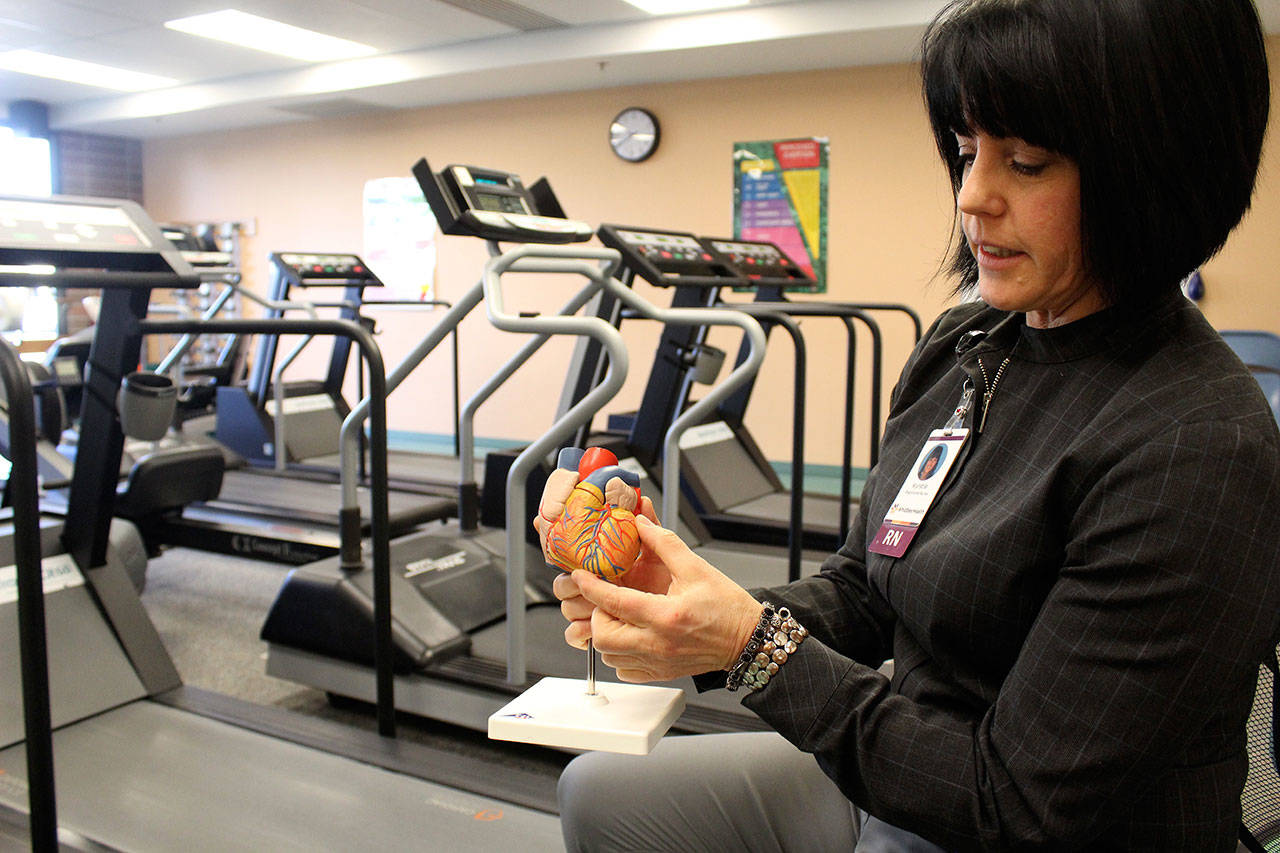It’s Valentine’s Day.
Time to have a heart-to-heart about hearts.
On cue, Janie Keilwitz states the stats: Heart disease is the No. 1 killer of American women; two-thirds of women who die of heart attacks had no prior symptoms; only 54 percent of women know heart disease is more likely to kill them than cancer.
Keilwitz knows these facts by heart because hearts are her specialty.
A registered nurse with a master’s degree in cardiovascular physiology, she oversees WhidbeyHealth’s Heart of a Woman cardiac screening program. Supported with grants from Whidbey Island’s three Soroptimist International chapters, the screening and consultation is free for women who otherwise couldn’t afford it.
“I see women who have absolutely no idea they are at risk for a heart attack,” says Keilwitz. “So many women continue to think breast cancer is most likely to kill them.”
That’s worrisome, she says, because despite years of national public awareness campaigns, such as “Go Red for Women,” many women still don’t realize that heart disease is an equal opportunity killer.
Women are actually more likely to die of heart disease, also known as coronary artery disease, than men — and have been since 1984.
Yet, surveys show that among African-American women ages 20 and older, 48 percent suffer heart disease but only 14 percent consider it their greatest health problem. Among Hispanic women, one in three are aware that heart disease is their leading killer but only one in eight say they’ve discussed it with their doctor.
Heart disease kills nearly twice as many women than all forms of cancer combined, according to the American Heart Association.
Sandra Berry of Oak Harbor didn’t know these facts six years ago.
But then a Heart of a Woman screening in 2012 revealed she suffered from high blood pressure and Type 2 diabetes. At age 70, Berry faced the specter of heart disease, possibly a heart attack.
The Heart of a Woman consultation includes a complete cholesterol test, fasting blood sugar test, heart rate, body mass index and a review of family history. With results in hand five minutes later, Keilwitz then reviews the numbers and makes recommendations for getting heart healthy. She also forwards the information to their doctors or refers them to a doctor if they don’t have one.
“This is a whole other way to look at it,” says Berry, who ultimately dropped from a size 16 dress to a size 10 through steadfastly exercising and watching what she ate. “Doctors tell you the numbers but not what to do about it. They want you to take this pill or that pill.
“This program tells you how to meet goals and get the numbers down.”
Through community outreach and providing a medical safety net, Berry says Whidbey Island’s Soroptimist clubs of Oak Harbor, Coupeville and South Whidbey are making a difference for many residents.
“The motivation to continue exercising, reading labels, continuing to learn about nutrition and the benefits of exercising, and especially learning how to breathe, I totally credit the Heart of a Woman program,” she said.
Keilwitz teaches the art of abdominal breathing, which has been proven to reduce blood pressure and stress, as part of WhidbeyHealth’s rehabilitation team that works with heart patients.
Education and exercise are its key tools, explained Kyrstie Sinchak, one of four nurses with the cardio-pulmonary rehabilitation center that’s jam-packed with treadmills, bicycles and other spinning, pumping sweat machines.
“We focus on aerobic exercise because that’s what really boosts the cardiovascular system,” Sinchak said.
Making a dent in a sedentary lifestyle, obesity, high blood pressure and diabetes is a gradual process. “Slow and steady wins the race,” she says. “That’s what we say here all the time.”
Men aren’t left out of Whidbey’s community fight against heart disease.
Through the Heart of a Lion program sponsored by the Coupeville Lions Club, low-income men who live in Coupeville or Greenbank may also get screened for free at WhidbeyHealth Medical Center.
Appointments must be made in advance for both programs.
Symptoms of a heart attack differ between men and women, which is another message that health educators continue to emphasis.
Unlike the sudden drop-you-to-your-knees excruciating chest pain experienced by many men, a women’s first indication of a heart attack could be upper back pain or it could be mistaken for the flu or acid reflux.
“The symptoms for a woman can be much different than a man’s,” says Keilwitz. “It can be a sharp pain between their shoulder blades, shortness of breath, being severely fatigued or nauseous and just not feeling right.”
Other symptoms women should look out for are dizziness, lightheadedness or fainting, and pain in the lower chest or upper abdomen.
Over the years, Keilwitz has seen the power of knowledge and the power of preventive screening.
“When I find people with elevated numbers, I spend an hour discussing with them where they want to be and how to get there. Many come back a year later, and I just look at them and say, ‘Wow.’
“I see significant changes. It’s really powerful.”
• Screenings for Heart of a Woman and Heart of a Lion are offered on the first Tuesday of the month at WhidbeyHealth Medical Center. Call 360-321-7656, ext. 2130 or 360-678-7656, ext. 2130 for an appointment.


